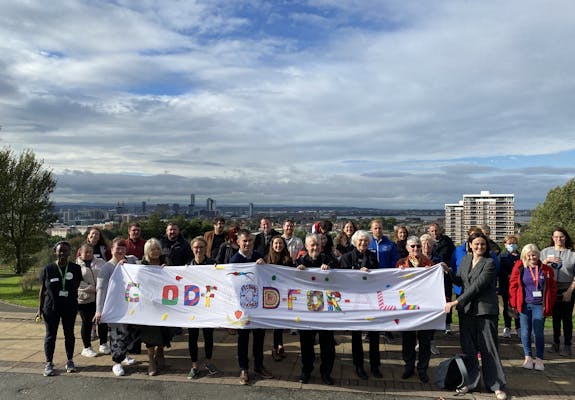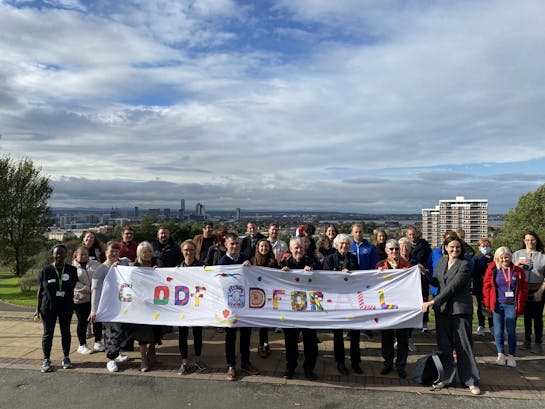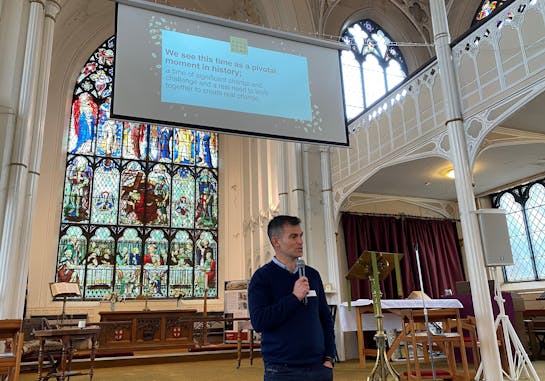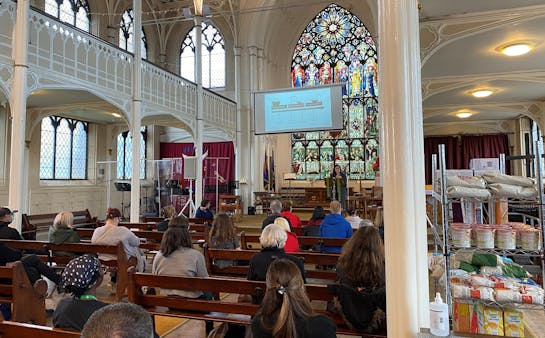
Liverpool Good Food Plan launch - join the movement
Churches and community groups are being invited to join the Good Food Liverpool movement, as part of a new strategy to tackle food insecurity and create a city “where everyone can eat good food”.
The Good Food Plan aims to address key issues including acute hunger, chronic food insecurity, access to and take-up of healthy, nutritious food, and the sustainability of food supply in the city.
Five goals were unveiled at a launch event in St George's church in Everton by Liverpool’s Food Insecurity Task Force, a coalition including Liverpool City Council, our partners Feeding Liverpool, Liverpool Charity and Voluntary Services (LCVS), and St Andrew's Community Network.
The task force wants to see the end for a need to food banks and people having to choose between 'heating or eating', by tackling the root causes of food insecurity. It comes the day after the UK government ended the £20 Universal Credit uplift, putting thousands of people at risk of being pushed into poverty.
The Good Food Plan goals are:
- Goal 1: ‘Good Food’ at points of Crisis - ensure people in crisis get access to ‘Good Food’ quickly and easily.
- Goal 2: Uncovering the True Scale of Food Insecurity - better understand and document the scale and experiences of food insecurity.
- Goal 3: Enabling Food Citizenship - enable people to have the power, voice, resources and motivation to shape their local food environments and the food system as a whole.
- Goal 4: Shifting Policy and Practice - shift policy and practice to enable ‘Good Food’ to flourish.
- Goal 5: Connecting the Community - bring together a community of people and organisations that have a part to play in achieving good food for all.
Guests at the launch (Thurs Oct 7, 2021) heard 32% of adults are food insecure in Liverpool, the city is home to three of England's ten most economically deprived 'food deserts', with only 12% of children aged 11 to 18 eating their five-a-day, and nursery food often deficient in energy, carbohydrates, iron, and zinc.
Meanwhile, an estimated 140,000 tonnes of food is wasted in Liverpool each year, producing around 368,000 tonnes of CO2 emissions - the equivalent of 80,033 cars.
Liverpool’s Food Insecurity Task Force said that it “sees this time as a pivotal moment in history; a time of significant change and challenge that also presents a rare opportunity to define what ‘Good Food’ means to us.”
Phase 1 of the Good Food Plan will be about tackling immediate and urgent challenges, while building a framework to create real systemic change longer term.
The Good Food Plan states that “for real change to happen we must come together as a community of people and organisations interested in achieving Good Food for all.”
Churches, community groups, and individuals are encouraged to join the Good Food Plan movement by signing up for regular updates, following @GoodFoodPlan on social media, having conversations in your community and sharing #GoodFoodLiverpool content with your networks.
The strategy is for the plan to be an evolving, living document owned by local people and organisations and informed by real time action and reflection, taking a fundamentally new approach by shifting power to people and communities to create real change.

Launching the plan Dr Naomi Maynard, Food Insecurity Lead Executive Together Liverpool and Network Coordinator of Feeding Liverpool said: “This is the beginning of our journey and we invite you to join us. No matter who you are or what you do, there’s a role for you to play to ensure that everyone in Liverpool can eat to Good Food.”
Kevin Peacock, Chief Executive of St. Andrews Community network and co-chair of Liverpool’s Food Insecurity Task Force said: “We want to end the need for food banks. Emergency food provision (like food parcels from a food bank) is essential and has been a lifeline for many during the pandemic but using a food bank should be rare and short term and we must better understand and tackle the root causes of food insecurity.”
Calling for a reversal in the UK government's decision to cancel the Universal Credit £20 uplift, he added: "In the pandemic people have been relatively protected so with the removal of the Universal credit uplift, fuel and food price increases and furlough ending, we are genuinely concerned about people making ends meet over winter."
Melisa Campbell, Consultant in Public Health at Liverpool City Council and co-chair of Liverpool’s Food Insecurity Task Force said: “The relationship between food insecurity and health is clear.
"In order to make budgets stretch, people are forced to purchase food items that are cheap, often processed and lacking in nutrition in order to put a meal on the table. This is resulting in poorer health for many families and exacerbates existing medical conditions.”
Father Christopher Fallon, Co-chair of Feeding Liverpool and Director for the Permanent Diaconate Roman Catholic Archdiocese of Liverpool echoed the calls for a reversal in the cut to Universal Credit.
He said: "The gospel is very clear that if someone is in need, you help them. "Christian churches have always been at the forefront of charitable work, but also of promoting the value of the dignity of every person, and food poverty is crucial to that question.
"If people are struggling to feed themselves and their family, they are not able to feed themselves properly that affects everything in their life, their prospects, their health their human dignity, and so it is as a consequence of our faith that we have a duty to get involved.
"The vast majority of the foodbanks are hosted in faith organisations and this has become a real concrete example of the faith being lived out and that's true not just of the Christian faith but of other faiths as well, particularly in Liverpool we have the Muslim community very involved through Micah."
Calling on churches to join the Good Food Liverpool movement, he said: "Lots of churches and church led organisations are already involved, that could be greatly increased in the provision of good food to those in crisis, but more importantly it's about the understanding of the problem.
"Most people in our congregations probably are not experiencing food poverty and there are still a lot of misconceptions and stereotypes around that, so as churches and church leaders we have the opportunity to educate our own congregations first of all about the real situation.
"Also the churches have influence in the community both locally and nationally, so Feeding Liverpool aim which is about changing public policy, the churches have a good track record in that but could do a lot more, so it's in the area of understanding, education and of campaigning that the biggest challenges are for the faith communities."

Together Liverpool Chair Rev Canon Dr Ellen Loudon, Director of Social Justice for the Diocese of Liverpool and Chair of voluntary sector partnership VS6, the Child Poverty Life Chances Group, and Micah Liverpool said after the launch: "Liverpool’s Good Food Plan is a fantastic vision to create a city where everyone has access to sustainable and affordable food.
"It is a great example of how people and organisations can come together to develop solutions for food insecurity, particularly our VCFSE (Voluntary Community, Faith and Social Enterprise) organisations that have been working extremely hard to support people throughout the pandemic.
"The ambitions within the plan will likely have impacts throughout the Liverpool City Region and complement the great work already happening locally within our other boroughs.
"The plan also aligns closely with VS6’s Sustainable and Affordable Food Assembly recommendations to address food insecurity across the City Region, and we are pleased that the Good Food Plan for Liverpool is emerging at such a significant time."
MP Ian Byrne said “People have little to no influence in decisions being made about the food that’s on their high streets and on their supermarket shelves. We want to change this. We want people to have a say in what type of food is in their neighbourhoods, on their high streets, in their schools and other places they go to eat or shop for food. We want the Right To Food where every household in our city can afford healthy and nutritious food, and to tackle the inequalities we see in our communities by a change in legislation.”
Councillor Jane Corbett said “With the impact of austerity and now the pandemic, poverty is rising very fast. As a council we will continue to support our citizens struggling to make ends meet, with emergency grants and household items for as long as we can. In this day and age it is morally wrong that so many families are having to decide between putting food on the table, clothing their children, paying the fuel bills or keeping a roof over their head.
This Good Food Plan builds on the many years a good number of us have been responding to food insecurity, working alongside those most affected, and taking our partnership work to the next level. Government must now finally agree to the Marmot policy action to “ensure a healthy standard of living for all.”

The Good Food Plan has been developed in partnership with people and organisations including:
Liverpool City Council, Liverpool Charity and Voluntary Services, Feeding Liverpool, North Liverpool Foodbank, St Aidans Pantry, Micah Liverpool, Liverpool Arabic Centre, Together Liverpool, Merseyside Youth Association, Food Active, The University of Liverpool, The Food Domain, Feedback Global, The Food Domain, St Andrews Community Network, Fans Supporting Food Banks, Liverpool Hope University, Torus Foundation, Liverpool Health Partners, Arena Partners, NESTA’s People Powered Results Team, Nugent Care, The Joseph Lappin Centre, Kensington Fields Community Association and The GreenHouse Project.
View the plan and sign up for updates here on the Feeding Liverpool website.
Join the conversation:
Follow Liverpool’s Good Food Plan on social media and use #GoodFoodLiverpool to join the conversation:
Instagram: https://www.instagram.com/goodfoodliverpool/
Facebook: https://www.facebook.com/goodfoodliverpool/
Twitter: https://twitter.com/goodfoodlpool
